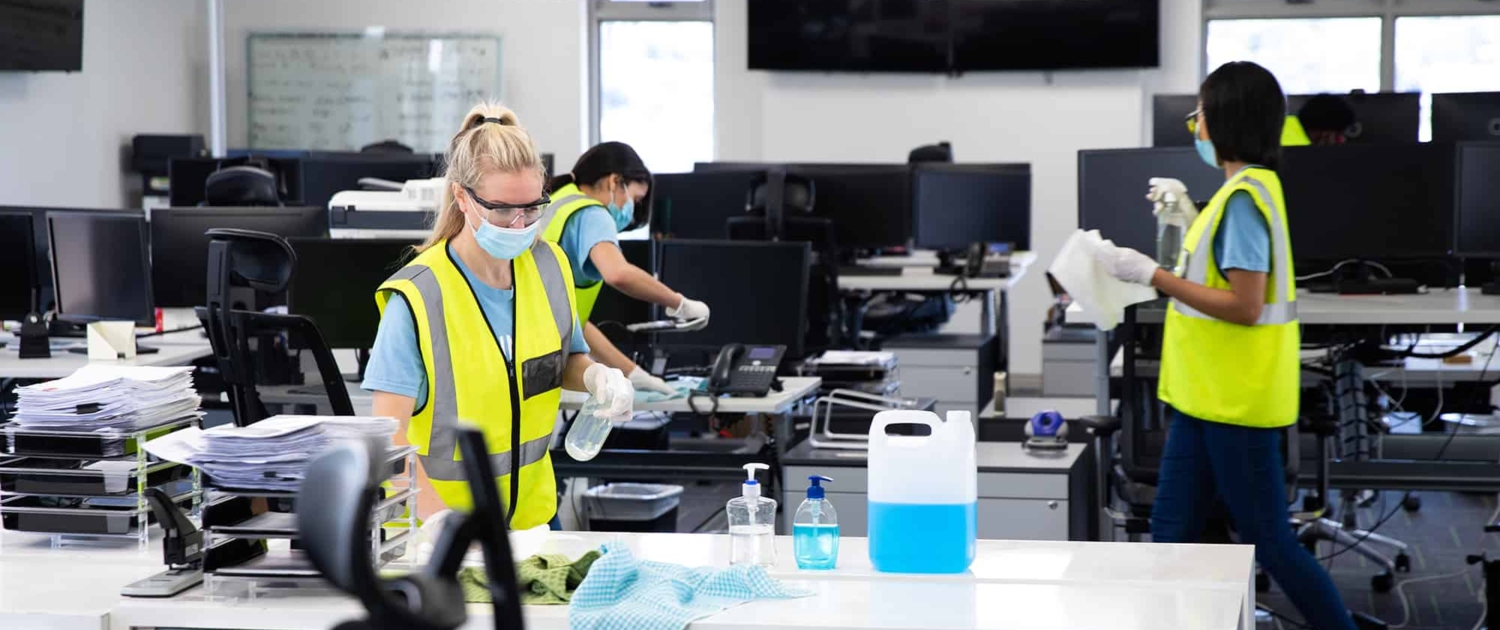
Nearly 66% of employees want better office cleaning practices. Make sure your office meets the standards of your employees by implementing a consistent office cleaning schedule.
How Often Should Offices Be Cleaned?
A clean office helps keep your employees happy, healthy, and organized—but everyone has a different schedule. Your facility cleaning depends on the number of employees you have and the type of business you run.
Many businesses operate on a hybrid model in which employees only come to the office once or twice a week. These companies don’t require the same office cleaning schedule as those that work in the office full time.
Want to customize a facility cleaning schedule for your office?
Office Cleaning Schedule for Hybrid Model Offices
If you and your employees only come into the office once or twice a week, you don’t want to waste your money with a daily cleaning schedule. Instead, opt for customized weekly cleaning.
Your weekly office cleaning checklist should include:
- Cleaning and disinfecting high-touch surfaces (pens, doorknobs, tables, light switches, handles, stair rails, elevator buttons, desks, keyboards, toilets, faucets, and sinks)
- Sanitizing high-traffic areas (conference and break rooms)
- Disinfecting and emptying shared fridges
Many professional cleaners offer customizable plans, so you can schedule your weekly cleaning (or twice a week, depending on your work schedule) on the days everyone is in the office. Your plan depends entirely on you and the needs of your business.
Facility Cleaning Schedule for Full-Time, In-Person Businesses
If your employees work in-office every day, you need a fuller office cleaning schedule to prevent bacteria buildup, as dirty offices lead to poor work ethic and an unpleasant atmosphere.
Your daily office cleaning services should include:
- Disinfecting high-touch surfaces and high-traffic areas
- Emptying trash
- Dusting
- Sweeping and vacuuming
- Floor cleaning and mopping
- Window cleaning
- Wiping down appliances
How To Schedule Deep Cleaning
Your office needs a professional deep clean two to three times per year. Depending on the size of your office and the number of employees and customers you have, you may need more. A deep clean includes:
- Thoroughly cleaning the floors
- Changing your air filters
- Cleaning tile grout
- Dusting and sanitizing upholstery and drapes
- High dusting for ceilings
- Vacuuming hidden areas (underneath tables, chairs, desks, and appliances)
Janitorial providers should complete your deep cleans to ensure every nook and cranny is sanitized. Professional cleaners also have adequate supplies for every surface or texture.
Consider scheduling one deep clean every quarter with regular maintenance in between to maintain a safe and healthy environment for your employees and customers.
Factors To Consider When Developing Your Office Cleaning Schedule
The Size of Your Building/Number of Employees
The average floor contains 764 bacteria per square inch! So, the higher the square footage in your office building, the more bacteria your building has and the more cleaning services you’ll need. Larger buildings also mean more employees and people touching the same surfaces.
Factor in the square footage of your building and the number of employees when developing your cleaning schedule to ensure your facility and team are properly taken care of.
Number and Type of Customers
The number of people coming in and out of your office also affects your cleaning schedule. More people equals more bacteria, trash, debris, and toilet usage.
Consider the type of people that walk through your building. Do you meet with construction workers or contractors wearing dirty boots? Are any of your clients in the healthcare industry? Some customers bring in more germs than others because of their work, so keep them in mind when making your office cleaning schedule.
Features and Surfaces in Your Office Building
Some unique features and surfaces require extra care because they hold a lot of bacteria. These include:
- Upholstery
- Thick curtains
- Shared appliances (fridge, freezer, microwave, coffee maker)
- Carpeted floors
Thick upholstery and carpeted floors store dirt, dust, hair, and germs. If you have carpet, your commercial cleaner needs to vacuum regularly to avoid the buildup of dust and debris, as carpet holds up to 200,000 bacteria per square inch. Upholstery and curtains trap dust and get dirty quickly—and can even grow mold if not regularly cleaned.
Benefits of Regular Commercial Office Cleaning
So, why should you outsource your cleaning services? There are many reasons, including:
Increased Productivity
When you don’t have to worry about deep cleaning your office, you can focus more on daily operations and the success of your business.
Clutter and dirty areas distract employees. A professionally cleaned environment keeps your team productive since they’re not focused on messes in the office.
Improved Employee Health
When your shared surfaces aren’t cleaned regularly, bacteria and dust build up. This is harmful to your employees, especially those with asthma or respiratory issues. Creating an office cleaning schedule with a commercial cleaner reduces the number of germs in your space, so your employees can stay healthy.
Where Can I Get Started?
If you want to create an effective office cleaning schedule, partner with Absolute Janitorial. We specialize in office cleaning and can tackle projects of any size.
Our office cleaning services include:
- Trash removal
- Deep cleaning
- Sweeping
- Mopping hardwood floors
- Vacuuming carpets
- Cleaning windows
- Cleaning and sanitizing restrooms
Create your customized office cleaning schedule with our expert janitorial team today.